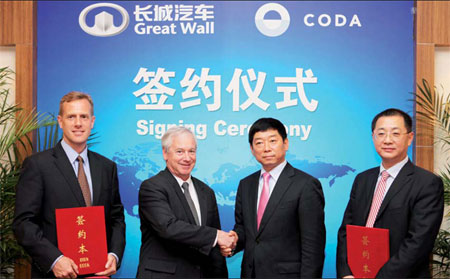Coda aims high
Updated: 2012-07-06 12:27
By Wang Chao (China Daily)
|
||||||||
|
Great Wall Motors and Coda Automotive have signed a deal to develop electric vehicles. Provided to China Daily |
EV deal with Great Wall might be a boon to cost-conscious consumers
Coda Automotive Inc, a Los Angeles-based private company that designs, builds and sells electric vehicles, is building close ties with its Chinese partners to jointly develop EVs.
In April, Coda signed a contract with Great Wall Motors Co, an automaker based in Hebei province, to develop an entry-level EV for the North American, Chinese and European markets.
Coda comprises three business lines: Coda Automotive, Coda EV Propulsion Systems and Coda Energy.
The new EV will feature Coda's propulsion and battery technologies and Great Wall's manufacturing capability. The model is expected to enter the market in 2014.
Unlike its EV predecessors Nissan Leaf and Chevy Volt, which hyped up performance and range, the new Coda EV is being marketed as an affordable option.
Phil Murtaugh, CEO of Coda, says the cooperation "will enable us to bring EVs to global markets in a very efficient and cost effective manner".
"Ultimately, this will enable drivers worldwide to go electric affordably and support our mission of putting an EV in everyone's garage," he says.
Murtaugh has strong ties with China. Before he became Coda's CEO, he served as the president of General Motors China; the executive vice-president of SAIC Motor in Shanghai; and president of Chrysler Group LLC, Asia-Pacific region.
This would be the second EV developed by Coda. In March, its first EV rolled off the assembly line and was initially sold in California.
The first Coda EV is a zero-emissions, four-door sedan that can seat five with a full-size trunk.
It has Chinese genes, too. The body of the EV is being built by Chinese partner Hafei Motor Co, which is based Heilongjiang province, and the battery is being co-produced by Lishen Battery Joint-Stock Co, a lithium-ion battery manufacturer in Tianjin that also supplies batteries to Samsung, Motorola and Apple.
The EV will cost $37,250 (29,590 euros). With subsidies from the US federal and state governments, consumers can potentially buy it for $20,000.
Jacques de Selliers, founder of Going-Electric, an association for EV users in Europe, says stressing affordability is the right strategy.
"If consumers cannot afford it, there is no meaning talking about the EV," he says.
The price of electric cars is usually more expensive than conventional cars but De Selliers says the high price is only one of the problems that hinder the sale of EVs in Europe, the US and China.
"The benefit from the government can be crucial in this 'going-electric' process," he says.
"The government should offer financial and non-financial benefits for potential EV buyers. For instance, Norway has the highest concentration of electric vehicles in Europe because of government support such as tax exemption and parking benefit," he says.
Coda and Great Wall will work respectively in Los Angeles and Baoding, Hebei province. The vehicles will be assembled by Great Wall first and the final assembly will be in the Coda factory in the US.
Shang Yugui, deputy general manager of Great Wall, says the cooperation means fresh EV technology for Great Wall.
"It has accelerated our EV development while maintaining our traditional advantage in conventional vehicles," Shang says.
Great Wall Motors delivered nearly 500,000 vehicles worldwide last year. Most of its revenue came from the sale of SUVs and diesel-powered vehicles.
Lin Cheng, deputy director of the National Engineering Laboratory for Electric Vehicles in Beijing, says an affordable price is important, especially in developing countries like China.
"In Europe and the US where environmental groups are active, an expensive product might have a market, but in China, the market prospects will be bad if it is very pricey," Lin says.
He says that because the regulatory environment in China currently allows for a host of incentives and subsidies for EVs, consumers might be able to benefit from the policy.
But Coda was not done with its Chinese connections. Two weeks before the deal with Great Wall on April 25, Coda signed an agreement with Shanghai International Automobile City to put its first EV model into operation, making it the third international brand to roll out a car in this district.
C.C. Chan, president of Electric Vehicle Association of Asia Pacific, says the new model will have great potential in China since the country is under pressure with high demand for traditional energy, such as diesel and gasoline.
"Electric vehicles can alleviate the pressure from gas demands, which is a good thing for the country with such a big population. But attention should also be paid to the safety of EVs, so the consumers will trust this new vehicle and eventually buy it once charging facilities are available," Chan says.
wangchao@chinadaily.com.cn
(China Daily 07/06/2012 page13)

 Relief reaches isolated village
Relief reaches isolated village
 Rainfall poses new threats to quake-hit region
Rainfall poses new threats to quake-hit region
 Funerals begin for Boston bombing victims
Funerals begin for Boston bombing victims
 Quake takeaway from China's Air Force
Quake takeaway from China's Air Force
 Obama celebrates young inventors at science fair
Obama celebrates young inventors at science fair
 Earth Day marked around the world
Earth Day marked around the world
 Volunteer team helping students find sense of normalcy
Volunteer team helping students find sense of normalcy
 Ethnic groups quick to join rescue efforts
Ethnic groups quick to join rescue efforts
Most Viewed
Editor's Picks

|

|

|

|

|

|
Today's Top News
Health new priority for quake zone
Xi meets US top military officer
Japan's boats driven out of Diaoyu
China mulls online shopping legislation
Bird flu death toll rises to 22
Putin appoints new ambassador to China
Japanese ships blocked from Diaoyu Islands
Inspired by Guan, more Chinese pick up golf
US Weekly

|

|







